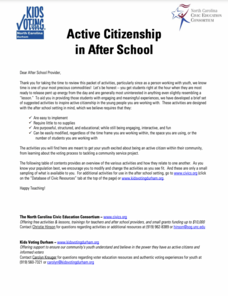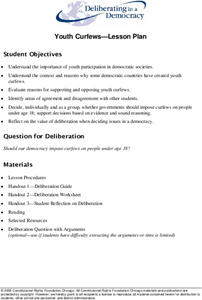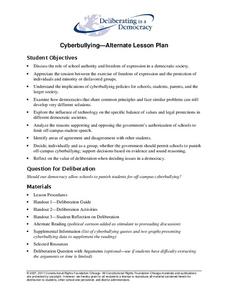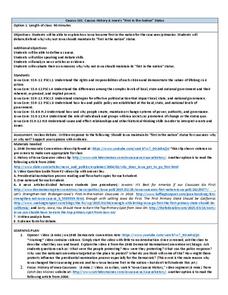Museum of Tolerance
Citizenship Then and Now: Comparing Ancient Rome and Contemporary American Society
Class members research citizenship in Ancient Rome and in the United States and use the provided graphic organizers to compare the rights and responsibilities of citizens in these two democracies.
Carolina K-12
Active Citizenship in After School
Active citizenship is the bedrock of any great democracy. Continue the trend by teaching the next generation about voting rights and the functions of elections in society. The variety of activities in the resource includes a human...
Museum of Tolerance
The Role of Citizens in a Participatory Democracy
Groups research participatory democracies and compare the role and rights of citizens in ancient history with those in recent U.S. history. Guided by a series of questions, individuals compose a persuasive essay in which they discuss the...
Curated OER
A River Ran Wild: An Environmental History
The Nashua River serves as the focal point of an investigation of the treatment of and care for natural resources. A reading of A River Rand Wild: An Environmental History by Lynne Cherry, launches the study and class members consider...
Museum of Tolerance
Documents That Shape Society
The Bill of Rights is a foundational document of American democracy, much like the Nuremberg Laws were a foundational document of the Reichstag of Nazi Germany. But that's where their similarities end. Engage high schoolers in a...
Close Up Foundation
Rights Auction
In an engaging activity on universal and unalienable rights, learners work in groups to establish a democratic nation and determine what principles they want to protect to ensure a democratic society. They conduct a "rights auction" in...
What So Proudly We Hail
The Meaning of America: Enterprise and Commerce
Using Mark Twain's The Man That Corrupted Hadleyburg, invite your learners to consider the concept of virtue in a democratic society devoted to gain and self-interest. This stellar resource guides your class members through a close...
Deliberating in a Democracy
Youth Curfews
Don't stay out too late! Scholars analyze the need for youth curfews in a democratic society. They examine primary documents, case studies, and short video clips to form their opinions and take a position on the issue. Holding a class...
Facing History and Ourselves
The Audacity of a Vote: Susan B. Anthony’s Arrest
Susan B. Anthony's speech "Is It a Crime for Women to Vote?" takes center stage in a lesson that asks class members to consider how they might respond to what they consider an unjust law. Groups work through the speech paragraph by...
National Endowment for the Humanities
Revolution '67, Lesson 1: Protest: Why and How
To some people, protesting is as American as apple pie, but the factors that lead to protests can be as confusing to veteran activists as to today's youth. Revolution '67 explores the riots in Newark, New Jersey as a case study. ...
Deliberating in a Democracy
Cyberbullying—Alternate Lesson Plan
Should schools be permitted to punish young scholars for off-campus cyberbullying? After reading a passage that details statistics about cyberbullying and Supreme Court rulings about schools' ability to limit student speech,...
Deliberating in a Democracy
National Service
Uncle Sam wants you to serve! Scholars investigate the role of mandatory national service in an open democracy. They research, watch a video, and hold a debate surrounding the issue of requiring one year of service to gain a better...
City University of New York
Presidential Elections and the Electoral College
To understand the controversy surrounding the US 2000 presidential election, class members investigate the rationale behind the Electoral Collage, the intimidation involved in the election of 1876, and the 2004 American League...
Caucus 101
Caucus History and Iowa’s “First in the Nation” Status
What is a caucus? Why is Iowa's first? Why did Iowa shift to the caucus format? After researching these basic questions, class members debate the question of whether or not Iowa should maintain its "first in the nation" status for caucuses.
Robert F. Kennedy Center for Justice and Human Rights
Vaclav Havel: Free Expression
Develop an understanding of universal human rights, particularly the freedom of expression, with the questions and activities that analyze the conflicts of Vaclav Havel. Learners define, interpret and rephrase the human rights article in...
Canadian Civil Liberties Education Trust
That’s Not Fair!
As part of a series of critical thinking exercises, kids consider issues of social justice, especially the factors that must be considered when trying to balance conflicting rights and freedoms.
Curated OER
Patriotic Symbols of the United States
Young historians take a close look at the most famous patriotic symbols of the United States and determine what they actually stand for. Symbols such as Uncle Sam, The Statue of Liberty, The Bald Eagle, and The Liberty Bell are studied....
City University of New York
Electoral College
A presidential election is a lot like the 2004 World Series, and it's also a lot like choosing an orange in a paper bag. Apply the process of the electoral college to these two analogies with a set of lessons about government...
Tennessee State Museum
Deciphering the Document: Unlocking the Meaning of the Emancipation Proclamation
Help your learners truly understand the Emancipation Proclamation by asking them the put it into their own words. After reading the document out loud to the class, and briefly discussing the legal language, split your class into small...
Facing History and Ourselves
The Weimar Republic: Historical Context and Decision Making
Did you know that way before Hitler became a dictator, he actually spent nine months in a German jail? Provide the background for the escalating point before the Nazi party took over in World War II through the exercises in the resource....



















